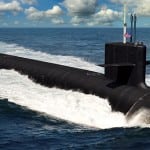
The Pentagon is pulling the plug on the contract for the JASON civilian science advisory panel even as contractor MITRE Corp. works on multiple studies for the National Nuclear Security Administration (NNSA), according to recent congressional testimony. The NNSA has "three studies being considered and planned with JASON pertaining to the topics of: cyber security of operating equipment; nuclear detonation detection; and plutonium aging," an agency spokesperson told Defense Daily on Friday. Rep. Jim Cooper (D-Tenn.), chair of the House Armed…

 By
By 










